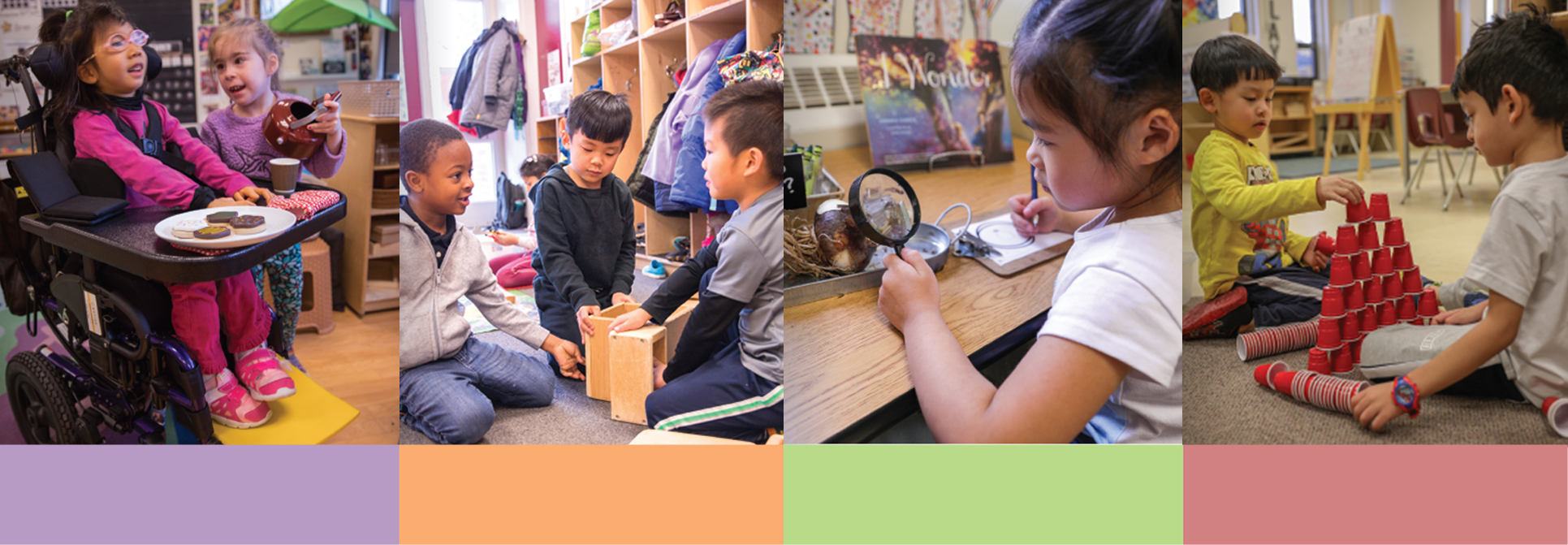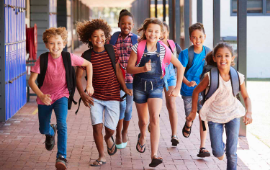
How Do Children Learn Through Play?
In our play-based program, children learn by:
- exploring ideas and language
- using hands-on activities to discover and learn
- experimenting with open-ended materials
- imagining and creating with the arts
These activities help expand their natural creativity, inquiry and imagination as they develop skills like:
- problem-solving
- abstract reasoning
- critical and creative thinking
- collaboration
- communication
Educators guide and support children as they explore, laying the foundation for literacy, math, and lifelong learning.
Meet the Educator Team
Each Kindergarten class has a teacher and a Designated Early Childhood Educator (DECE) working together. They bring complementary skills to create a nurturing and fun space that meets the unique needs of each child.

Play, Learn, Thrive: Welcome to Kindergarten
Learning Together
In Kindergarten, we focus on four key areas for learning:
- Belonging and Contributing: Building connections with others and understanding the world around them.
- Self-Regulation and Well-Being: Learning to manage emotions and care for themselves.
- Demonstrating Literacy and Mathematics Behaviours Skills: Early reading, writing, numeracy and problem-solving.
- Problem-Solving and Innovating: Developing creativity and critical thinking through hands-on activities.
Belonging and Contributing focuses on children’s:
- sense of connectedness to others
- ability to form relationships and make contributions as part of a group, a community, and the natural world
- developing understanding of how people relate to one another and to the world around them
What children learn within this frame provides them with a sense of being personally connected to various groups and communities. This learning lays the foundation for developing the traits and attitudes required for responsible citizenship.
Self-Regulation and Well-Being focuses on children’s:
- ability to understand their own thoughts and feelings, to see that others may have different thoughts and feelings, and to respect those differences
- ability to understand and manage their emotions and impulses, find ways to deal with distractions, and be aware that their actions have consequences
- awareness of their physical and mental health and wellness
What children learn through this frame allows them to focus, to learn, to respect themselves and others. This learning promotes well-being in themselves and others.
Demonstrating Literacy and Mathematics Behaviours focuses on children’s:
- ability to communicate their thoughts and feelings in various ways, using their bodies, words, symbols, images, constructions, and/or other forms of expression
- “literacy behaviours” - the various ways in which children use language, images, and materials to express ideas and emotions as they respond to words and stories, begin to think critically, and begin to read and write
- “mathematics behaviours” - the various ways in which children use concepts of number and pattern during play and inquiry; process various kinds of information; and begin to grasp mathematical relationships, concepts, skills, and processes
- curiosity about literacy and mathematics and love of learning in general, as they develop the habit of learning for life
What children learn in connection with this frame develops their capacity to think critically, to understand and respect many different perspectives, and to process various kinds of information.
Problem Solving and Innovating focuses on children’s:
- desire to explore the world out of natural curiosity, which develops their minds, their senses, and their bodies
- desire to make meaning of their world by asking questions, testing theories, solving problems, and using creative and analytical thinking
- confidence to explore the innovative thoughts and activities that naturally arise with an active curiosity, and to apply those ideas as they interact with others and with the world
What children learn in connection with this frame will help them develop the habit of applying creative, analytical, and critical-thinking skills in all aspects of their lives.
Family Partnerships
You are an expert on your child and an important part of your child’s education. We believe working closely with families is key to success and encourage you to be involved in your child’s learning.
- Share your child’s interests, strengths, and learning preferences with educators.
- Talk with your child about what they’re learning at school.
- Participate in opportunities for families in the classroom, like curriculum nights.
- Share what your child is learning at home, like drawings, photos or stories.
Access more tips and resources for Kindergarten families.
Supporting Every Child
We welcome and support children of all abilities, backgrounds, and experiences.
If your child has special education needs, we work with families, school staff, and community partners to ensure a smooth transition and successful learning experience.
Learn more about how we work with families to support students with special education needs and Multilingual Language learners.
Daily Routines: What to Know
Arrival and Dismissal
Your school will share specific start and end times, as well as arrival and pick-up routines.
Snacks and Lunches
- Pack healthy, easy-to-open snacks and meals that don’t need heating.
- Consider litterless containers to reduce waste.
- Make sure students can open their containers.
- Preparing lunch the night before can make mornings easier.
Washroom Independence
Children are encouraged to use the washroom and dress independently. Send extra clothes for accidents, and school staff will support children who need help while they adjust.
Personal Belongings
Help your child stay organized by:
- Labeling all personal items with their name.
- Providing a backpack that fits their lunch bag, books and extra clothes.
- Sending a pair of indoor and outdoor shoes.
Food Allergies
To keep everyone safe, we ask families to avoid sending foods that may cause severe allergic reactions. Inform your school if your child has allergies, and they will communicate specific allergy-related guidelines.
Outdoor Learning
Outdoor play is a big part of Kindergarten! Please dress your child for the weather:
- Winter: Send a warm hat, mittens, boots, and a snowsuit.
- Summer: Pack a sun hat, reusable water bottle, and sunglasses with UV protection.
Kindergarten is an exciting time for your child to grow, explore, and learn. We look forward to partnering with you to make this a wonderful experience!
Frequently Asked Questions:
- Kindergarten is an optional program in Ontario. Students are not required to attend school until grade one.
- Most children readily adapt to full-day learning in a caring, well-supervised kindergarten environment.
- Principals will be flexible in accommodating parent requests to have their children attend the program half-time.
- A parent can choose to transition their child from part-time to full time any time during the school year.
- Most York Region schools currently offer before and after school child care programming at the school, provided by a licensed Child Care agency working in partnership with the school.
- In schools where a before and after school child care program is not currently in place and there is sufficient interest (based on an interest survey), arrangements will be made to establish a program for the upcoming school year.
If there is a before and after school child care program onsite at your school location, parents can contact the Child Care Agency directly to inquire about before and after school care registration. Contact information for the child care agency will be available at registration or in the school’s office or on the school's website.
Related Content
